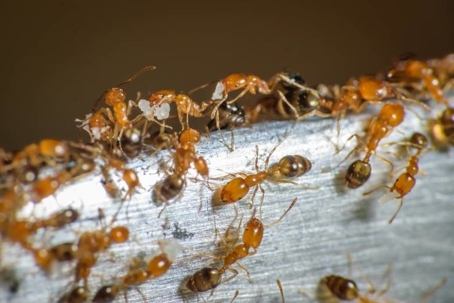What Do Pharaoh Ants Eat?
Pharaoh ants have a very broad and opportunistic diet, which is one of the reasons these ants are so persistent and difficult to eliminate. Their preferred foods include:
- Sweets: Sugar, syrups, honey, sweetened drinks, and fruit juices.
- Proteins: Meats (cooked or raw), dead insects, pet food, and protein-rich residues in kitchens.
- Fats: Grease, oily residues, butter or margarine, and greasy cooking surfaces or garbage
- Other organic materials: Toothpaste, soap residues, and blood and wound fluids (they will seek moisture and proteins around medical equipment in hospitals)
They’re drawn to warm, humid environments and often forage in kitchens, bathrooms, break rooms, and areas with plumbing or electrical fixtures. Because pharaoh ants can switch food preferences depending on colony needs, baits must be selected strategically—using both sweet-based and protein/oil-based formulations—to effectively target all foraging groups.
Do Pharaoh Ants Eat Insects?
Pharaoh ants aren’t active predators, but they will feed on other insects when the opportunity presents itself—especially when the insects are dead, dying, or immobile. They rarely hunt healthy, moving insects.
The insects they are most likely to eat include:
Dead or dying small insects
Cockroach nymphs (dead or weakened)
Fruit flies and other small flies
Ants of other species (dead workers)
Small beetles (larvae or freshly dead adults)
Soft-bodied arthropods
These are easy for them to consume because they require little effort to break down:
Psocids (booklice)
Insect eggs or larvae
If accessible, they may scavenge:
Fly eggs or maggots
Pantry insect eggs (e.g., Indian meal moth, dermestids)
Other ants’ brood (when raiding abandoned areas)
Behavior note
Pharaoh ants are primarily scavengers, not hunters. They are far more interested in:
Sugars
Grease
Proteins
Moisture
So their consumption of insects is mostly opportunistic—whatever they find lying around or trapped in sticky residues.
Do Pharaoh Ants Eat Animals?
Pharaoh ants regularly feed on protein-rich materials associated with animals:
Animal-based foods
Cooked meats (beef, chicken, pork, fish)
Raw meat scraps
Pet food (wet or dry)
Animal carcass residues
If they find a small dead vertebrate—like:
They do not eat the carcass in the manner of carrion insects, but they will:
Feed on exposed fluids
Take softened tissue
Feed on bacterial or fungal moisture around the carcass
Their feeding is surface-level scavenging, not true consumption of solid animal tissue.
Animal secretions
Pharaoh ants are highly attracted to moisture + protein, so they will consume:
Blood (fresh or dried if still soluble)
Wound exudate
Pet tears or eye discharge
Mucus or saliva residues
This is why they have a problematic reputation in hospitals—they’ll forage around IV sites, dressings, and medical equipment.
Pet-related residues
They may consume:
Cat or dog food crumbs
Spilled milk
Drool residues
Dead skin flakes
Pet waste if protein-rich (rare but documented)
Pharaoh ants do not eat actual animals. They scavenge animal-based food, and biological fluids, but cannot prey on or consume vertebrates.
Do Pharaoh Ants Eat Plants?
Pharaoh ants do not feed on plants in any meaningful way. They are not herbivores and they don’t chew leaves, stems, roots, or plant tissue. Here’s how they interact with plant-related materials:
What they do not eat
Leaves
Stems
Roots
Seeds
Wood
Fruit flesh (in most cases)
They’re not equipped to process solid plant matter and get almost no nutritional value from it.
What they might take from plants
While they don’t eat the plants themselves, they may consume plant-derived substances, such as:
Nectar or sugary plant exudates
If accessible indoors or in greenhouses:
Nectar dripping from flowers
Honeydew (from aphids or scale insects on plants)
The honeydew is especially attractive because it’s essentially a sugar solution.
Sweet fruit juices
Not the plant tissue—just the liquid:
Overripe fruit leaking juice
Fruit residues on counters
Mold or fungal growth on plant material
If plant debris has microbial activity, they may feed on the moisture and microflora—not the plant.
Pharaoh ants do not eat plants. Plants and plant tissues simply don’t fit their feeding biology.

